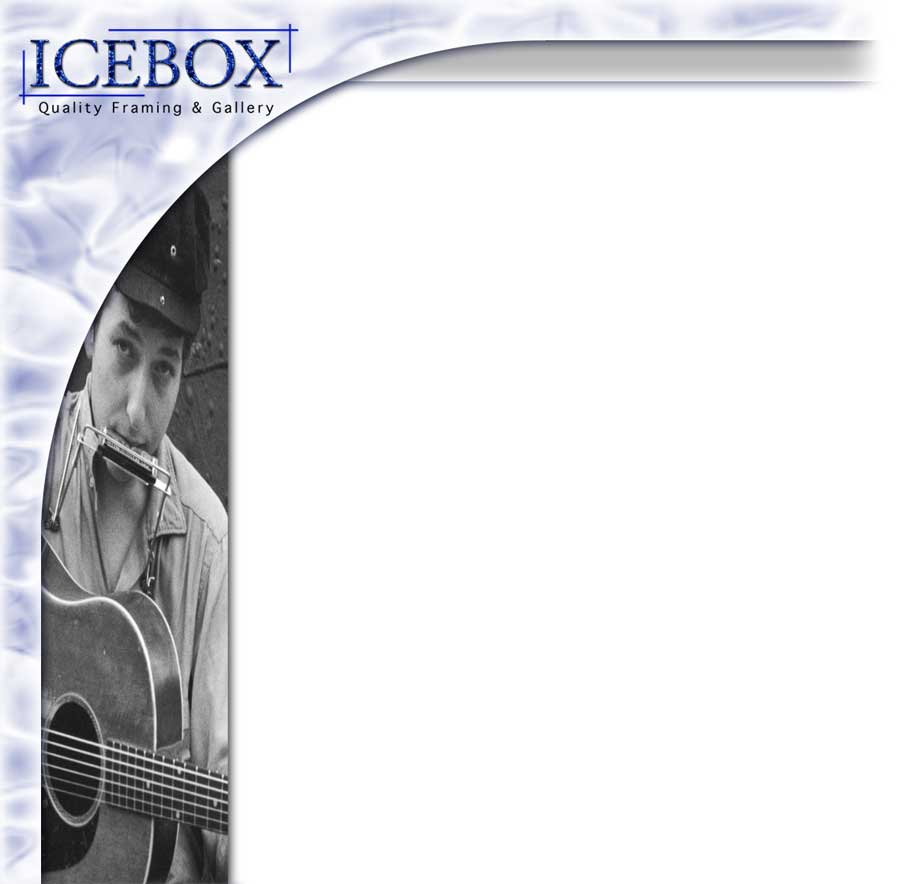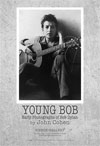The ride on the train was interesting for me,
at first you travel underground a lot like a subway and you emerge
in the Bronx. Gradually nature takes over the landscape. I thought
the river bluffs looked beautiful. I like train rides and they
take me back in time.
John was at the train station and he gave me a ride in his station
wagon back to Putnam Valley and on to his farm where he has lived
for many years. |
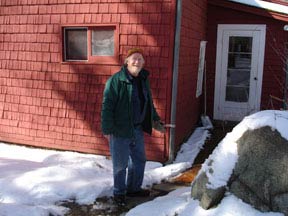 |
During
my afternoon into evening stay I had a nice visit with John. He cooked
me up food and we got to know each other. I enjoyed walking around
John’s
farmhouse, it is the kind that I really like. The house
sits just off the paved road that winds its way through the valley
alive with leafless aspens and hardwoods. You park near the stockpile
of firewood. John said he does it to keep active. I thought to myself:
You do this to keep warm. The barn red farmhouse is comfortable, filled
with books and records. Built with several additions and heated with
some wood stoves. He showed me his dark room. It was in a room that
you have to climb a ladder up into it. The modest but comfortable darkroom
showed signs that it is not used as often now as he had in the past
but evidence of on going creativity was everywhere in every room.
John’s farm is one of the original homesteads in the area. On
the road in we passed many fancy new homes. John said Putnam Valley
is becoming a “Bedroom Community” for commuters that work
in the city. This fact is out of sight and well disguised when you
are walking around John’s place. He has several out buildings.
Each one is made of old wood and painted with what I call Barn Red
paint. We walked past a tiny building that looked like a miniature
house. John said he keeps his books in there. They must be extra
books because I saw them in every room in the house. I think he said
in the past it was a guesthouse or play house for his kids. His kids
are all grown up now and John is a proud grandpa.
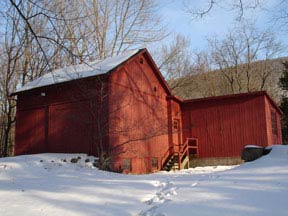 |
We headed to the barn, it was an up hill, and I followed
John on a tiny footpath through the fresh white snow. You climb
a few steps and enter the New England style barn. No cows or horses
anymore because the farmer was replaced with an artist. John has
a big room that he uses as his art studio. He has drawings and
painting pinned up, filed away in boxes, neatly stacked and framed
all over the room. John has been drawing and painting for years.
His work is calming and thoughtful. He loves to paint and draw
landscapes and he makes patterns and gesture brush strokes using
organic colors. |
| |
In another part of the barn he has steel cases that
hold his master reels of 16mm film.
John has made some extraordinary documentaries about artists, mountain villagers
weaving alpaca down in Peru, southern folk musicians playing banjos & Hillbillies
singing songs. |
| |
John exposed his first role of 16mm movie film the day he first
photographed Bob Dylan. John told me they made up a skit to do
for the camera. Something like an old Vaudeville moving
picture. The two of them were on John’s Greenwich Village
rooftop above his loft. The b/w film starts with a 20 year old
Bob Dylan dropping or jumping into camera view. Bob then proceeds
to open his guitar case that is filled with hats. Bob appears
amused as he tosses hats for the silent camera and John’s
first roll of movie film. |
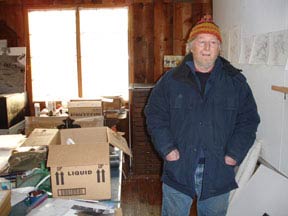 |
| |
|
| John unlocked the cabinet and swung open the doors.
It was filed with archival photo boxes each adorned with neat hand
lettering. Dozens of boxes, personal boxes, a personal history… Blue
Grass, Beat Generation 1959, and 60’s festivals, Musicians,
Joseph Albers, Peru Q’eros and Kentucky 1959. John pulled out
some boxes and we looked through them. |
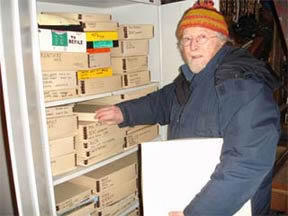 |
Soon we began to talk about the
show. He suggested that it might be a good idea to add some other
images to the Young Bob show; he did not want people to get bored
looking only at images of Bob Dylan. I was fascinated with this
idea and we talked about showing friends, artists and poets. The
people who played an active roll in the Greenwich Village art scene.
John’s images really captured the feeling of the art and
music scene. This was the scene that Bob Dylan found himself in
back in 1962. Music, art and poetry mixed together. What else do
you need? |
| |
|
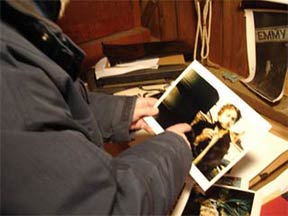 |
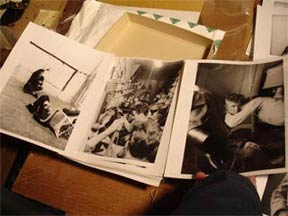 |
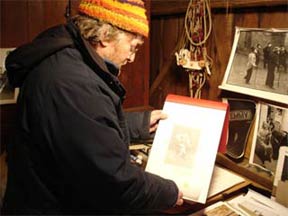 |
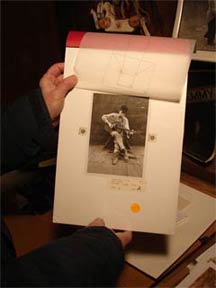 |
| |
|
| The pictures that we decide to show did not all happen
in 1962. In fact, some took place several years before and others
happened afterward. Some images did not even take place in the
city, but they all relate, because John made them. They all contain
history, a personal history via John Cohen but also a cultural
history for many more of us. We found a gem in a box that John
pulled out. A vintage print of Bob Dylan! It had been filmed for
a movie; John could not remember what movie. It was obvious though
because the print had a slip-sheet over it showing how the camera
would zoom into Bob Dylan’s face. The image looked old and
new at the same time. Years of hearing Bob Dylan songs flashed
before me. |
| |
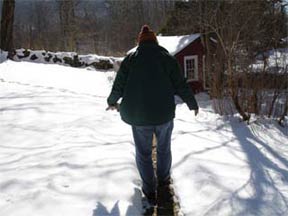 |
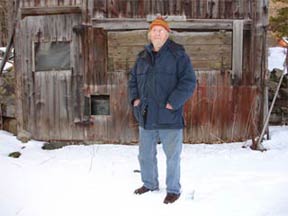 |
| |
| We left the barn and walked down another narrow path
to the old chicken coop. No chickens out their anymore-just
snow and pealing paint. After a minute or so, I noticed a rusty
front end of an old car. It was just the front point and the holes
for the headlamps. Wow! I said and John looked at me with a smile.
He picked up a hoop or metal wheel and looked at me just as I snapped
his picture. I felt like I had seen this before. Then it came to
me, like a slow train. This old car was in some of the color photographs
that John took of Bob back in 1970. They were included in the Self
Portrait album, and somehow I remembered this old rusty Chevy from
his picture in the album. |
| |
|
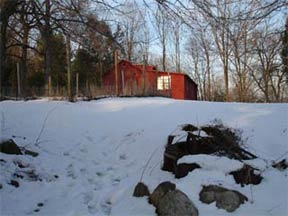 |
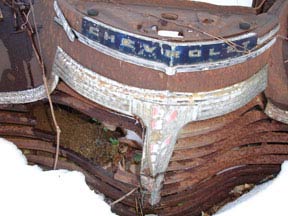 |
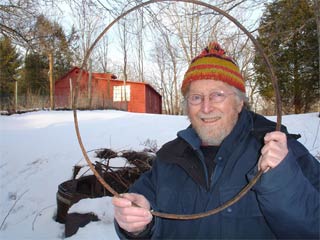 |
| |
|
| Here I stand in the February snow in 2006 and I remember
a picture from an album I have not seen in years. This was long
before I knew who John Cohen was or that he took the pictures.
I asked John if he had any of those color pictures, the one with
the car, and that I was hoping we could include some of them in
the show. I thought to myself, when I first saw and listened
to that album, I was in 9th grade. I always loved Dylan’s
music and felt remotely connected to him. I guess it was because
I was born in Duluth and my dad, who also was named Howard, was
born in Hibbing. Then I thought of how I was only 7 when
Bob and John took their first pictures together in 1962. |
| |
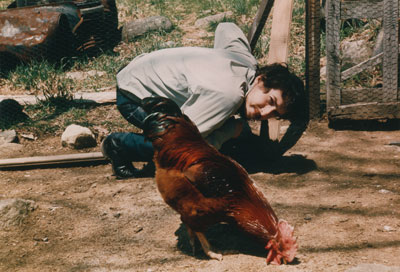 |
| |
In 1970 I was in Junior High School and John and
Bob where here in Putnam Valley having fun and playing with cameras,
kids and chickens. It was as if that old rusty car talked
to me.
Howard M. Christopherson
May 9th, 2006 |
|
